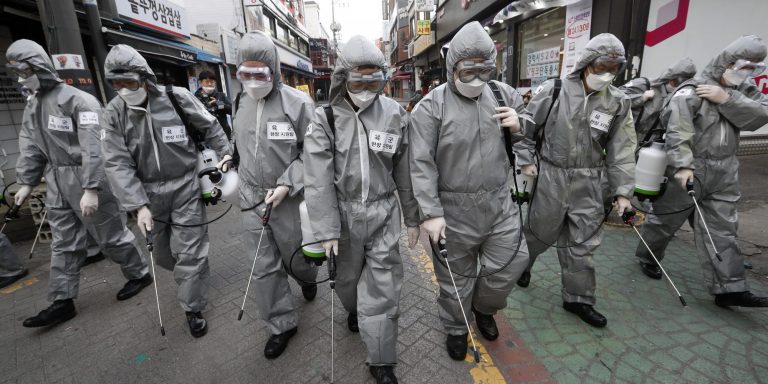INTELBRIEF
March 5, 2020
IntelBrief: Coronavirus (COVID-19) Spreads Amid Fears of a Global Pandemic

- Countries are struggling to counter the spread of the coronavirus respiratory disease, while also trying to figure out how to navigate a range of political, economic, and logistical challenges.
- High levels of distrust that populations in authoritarian countries have toward their governments will, at least in part, hinder a more effective response.
- Iran has 2,336 reported cases of the coronavirus and 77 people have died from COVID-19 so far, while one in ten government officials has tested positive for the disease.
- Italy has struggled to stay ahead of the outbreak, further stressing a society already beset by political infighting, allegations of corruption, and large-scale public sector inefficiencies.
.
The ongoing spread of the COVID-19 coronavirus is a medical emergency that will significantly stress countries’ public health systems around the world. Countries are struggling to counter the spread of the respiratory disease, while also trying to figure out how to navigate a range of political, economic, and logistical challenges. Just as the disease strikes hardest against patients with weakened immune systems, it also strikes hard in countries with weakened health care systems and strained relations between the government and the people. In an effort to limit the spread of COVID-19, authoritarian countries such as China, which has over 80,000 confirmed cases and 3,000 deaths, have imposed severe restrictions on travel and commerce that will limit the spread. But high levels of distrust that populations in authoritarian countries have toward their governments will, at least in part, hinder a more effective response. As of March 4, newly reported cases are appearing more rapidly outside of China than inside the country where it originated. These clusters formed among groups reporting recent travel to China. Now these clusters are metastasizing, through a combination of more focused reporting and tracking, as well as through local human-to-human transmission. Beijing has reported cases that were imported back into China and is imposing travel restrictions on people coming from countries such as Italy, much as these countries had imposed similar restrictions on travelers originating in China.
South Korea is struggling to address what is now the largest reported outbreak outside of China. Seoul’s challenges show that even countries with an advanced health care infrastructure can be overwhelmed by the sheer volume of cases. There are now more than 5,000 cases in South Korea, which has been a leader in reporting and monitoring new cases, in part because it has been so diligent about testing new patients and being transparent with the results. South Korean President Moon Jae-in convened an emergency meeting on March 3rd to address what he called an ‘absolutely grave’ shortage in face masks. Purchases of these masks by individuals not involved in health care or not infected, is making it difficult for those who truly need the masks—especially heath care personnel—to obtain them. South Korea’s struggles are based mostly on the overall volume of patients, while in Iran, the site of another widespread outbreak, the challenges are compounded by a country hobbled by sanctions and a government unwilling to be honest and transparent with its public. The BBC reports that Iran has 2,336 reported cases of the coronavirus and 77 people have died from COVID-19 so far. Iranian state media has reported that one in ten lawmakers in the country is now infected with coronavirus. Iran recently took the drastic step of releasing 54,000 prisoners in an attempt to control the spread of coronavirus throughout Iranian prisons, jails, and detention centers.
What happens in Iran is unlikely to stay in Iran, given the country’s geography and its connections throughout the region. There are newly reported cases throughout the Middle East, including growing numbers in Iraq, a country already war weary and trying to rebuild. The coronavirus can be particularly devastating in a country like Iraq, especially given the absence of government services at nearly every level. Even without the threat of a spreading coronavirus outbreak, Baghdad is unable to function as an effective government that can provide for the needs and security of its people; adding a respiratory contagion to the many ills already impacting Iraq will further exacerbate issues in a vulnerable country. COVID-19 is also exposing fault lines in countries with more resources, but which suffer from bureaucratic and institutional shortfalls of their own. Italy, whose national governance is consistently worse than its struggling economy, has reported more than 3,000 cases and over 100 deaths from the virus. Rome has struggled to stay ahead of the outbreak, further stressing a society already beset by political infighting, allegations of corruption, and large-scale public sector inefficiencies.
The response to the outbreak in the United States has been marked, as with everything else in Washington, by partisan rancor and contradictions between President Trump’s White House and the rest of his government. The government has stopped reporting new numbers of people tested for the disease, a move likely to sow further distrust while promoting conspiracies. More states are reporting cases, though the overall numbers are still low, with Washington state emerging as a potential hot spot. The virus is also casting a light on what is increasingly an unavoidable truth: that the medical infrastructure in the United States is in need of a dire overhaul, similar to the country’s roads and electrical grids, which are woefully insufficient and experiencing systemic decay. Deliberately underfunding science and medicine while continuing to over-fund the Global War on Terrorism and ‘all things military and security’ has made the United States vulnerable to threats not adequately addressed in current national priorities.
.
For tailored research and analysis, please contact: info@thesoufancenter.org